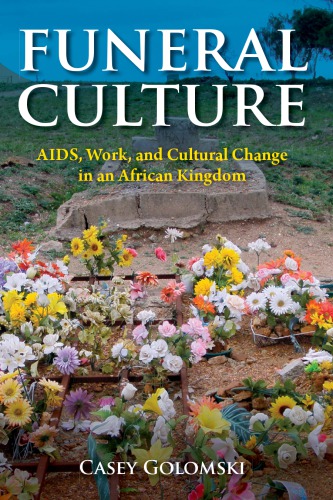Product desciption
Funeral Culture Aids Work And Cultural Change In An African Kingdom Casey Golomski by Casey Golomski 9780253036452, 0253036453 instant download after payment.
Contemporary forms of living and dying in Swaziland cannot be understood apart from the global HIV/AIDS pandemic, according to anthropologist Casey Golomski. In Africa’s last absolute monarchy, the story of 15 years of global collaboration in treatment and intervention is also one of ordinary people facing the work of caring for the sick and dying and burying the dead. Golomski’s ethnography shows how AIDS posed challenging questions about the value of life, culture, and materiality to drive new forms and practices for funerals. Many of these forms and practices―newly catered funeral feasts, an expanded market for life insurance, and the kingdom’s first crematorium―are now conspicuous across the landscape and culturally disruptive in a highly traditionalist setting. This powerful and original account details how these new matters of death, dying, and funerals have become entrenched in peoples’ everyday lives and become part of a quest to create dignity in the wake of a devastating epidemic.
“Original and insightful, Golomski’s Funeral Culture is a vivid example of the work of a new generation of Africanist anthropologists. It posits a lucid and compelling account of the ‘work’ that funerals do to both reproduce and change culture in a context that, at the time, was being decimated by AIDS. Golomski’s superb analysis shows what, as an ethnographic method, listening and deep care can yield. Beautifully written, ethnographically rich, multi-layered, and empathetic, this is anthropology at its best.”
— Nolwazi Mkhwanazi, editor (with Deevia Bhana) of Young Families: Gender, Sexuality and Care
“Funeral Culture is an intimately observed portrait of changing burial rites in a country struggling under the burden of HIV. Golomski at once plunges into the rhythms of everyday life in Swaziland and gestures out toward broader questions about the work of kinship and death. Brimming with colorful characters and rich descriptions, written in welcoming and accessible prose: this is ethnography at its best. A marvelous accomplishment.”
— Jason Hickel, author of Democracy as Death: The Moral Order of Anti-Liberal Politics in South Africa
“A highly original account of death and funeral cultures in southern Africa that enlarges understandings of ‘postcolonial cultural production’ as the outcome of both vernacular and state-driven historical consciousness and processes.”
— Hansjörg Dilger, author of Religion and AIDS Treatment in Africa: Saving Souls, Prolonging Life
“Explores the AIDS epidemic’s impact on people, families, institutions, and the state. Casey Golomski shows how people come to terms with the impact of disease, how they were affected, and how cultural change has occurred in the process, particularly in funerary culture.”
— John M. Janzen, author of The Social Basis of Health and Healing in Africa
“Funeral Culture offers a detailed ethnography of funerals in South African Swaziland, and scholars and students alike can breathe fresh air with this comparison of the neo-funeral cultural changes amongst the Southern African countries.”
— Reading Religion


